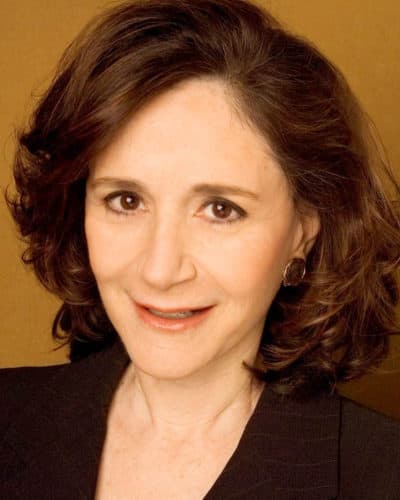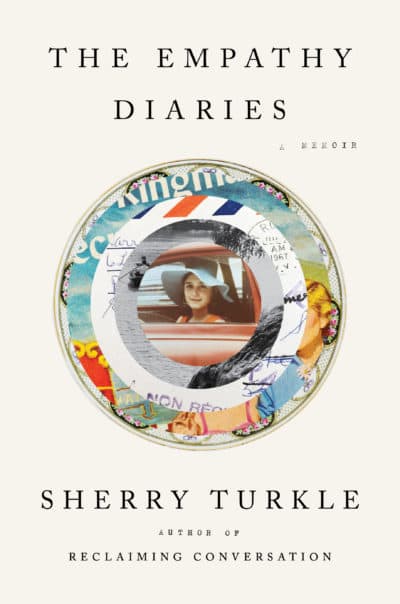Advertisement
Review
In Memoir 'The Empathy Diaries,' Author Sherry Turkle Examines How Technology Influences Identity
“From a very young age, I saw myself as my life’s detective,” Sherry Turkle writes in the introduction to her memoir, “The Empathy Diaries” (out now).
While I suspect that is true of many people — certainly of most memoirists — Turkle’s sleuthing led her to the heart and soul of the digital revolution, a destination relevant to us all. A clinical psychologist and founder of the MIT Initiative on Technology and Self, she has long been known for her incisive critiques of how we have appropriated the language of computing to describe our own processing of the world around us. We’ve become the human subjects of the technology we have created, she cautions, sacrificing our capacity for empathy along the way.

It is through this talent for observing what she calls “the inner history of technology” that Turkle made her name.
But her original name, the one she was born with, was Sherry Zimmerman, and the book opens with her meeting her biological father for the first time in 19 years. Her mother, Harriet, had left Charlie Zimmerman when Sherry was about a year old, but would never tell her why. However, she was explicit about one thing with her young daughter a few years later, when she married a man named Milton Turkle: While Sherry had to still answer to the last name of Zimmerman at school, in every other facet of life, she was to refer to herself with her stepfather’s surname. Divorce was shameful and not to be acknowledged.
Her already-rare visits with Charlie tapered off soon after her mother remarried, but the pattern of secrecy persisted well into her young adulthood. Though her mother, aunt and grandparents were vivacious and loving, they subscribed to the theory that difficult truths should be subverted or circumvented, but never openly acknowledged or discussed. This conspiracy of silence is what enabled fifth grade Sherry to remain ignorant about her mother’s first bout with breast cancer, about her subsequent surgeries and radical mastectomy when Sherry was in high school, and indeed, about Harriet’s terminal illness up until a few weeks before her death.
But silence extracts a huge cost. Turkle recounts coming home from school on the day of her mother’s first surgery and finding her grandparents seated in the kitchen. “I think of this moment often because it had to be the first time I was given a clue that my mother was ill, and I chose to not pay attention. Or rather, I paid close attention and did what the grown-ups signaled they wanted from me: to pretend not to notice what was happening. I knew I could receive no comfort, because no one would admit that anything sad had happened. It was a very particular loneliness: knowing that people around you were also sad but that you couldn’t be sad together.”
Advertisement
Here and throughout, her depiction of her working-class grandparents in Brooklyn is a clear-eyed but tender portrait of a couple for whom “Everyone not in our family was a stranger … My grandparents’ emotional lives seemed ruled by a fear of being singled out as Jews … My family seemed to be afraid of being found out, even if they weren’t sure for what.” Her sketches of her mother and her Aunt Gertrude are similarly nuanced and loving.
Both of those qualities are absent from her portrayal of her stepfather, Milton, who she depicts as selfish, self-pitying and manipulative. It’s a rendering that’s as flat as it is hostile. The roots of her antipathy lie in an early, deeply disturbing experience that, if not rising to the level of flagrant sexual abuse, was nonetheless frightening and needless. While Harriet is complicit in this incident, Sherry can draw on the deep reservoir of love for her mother to forgive her. But no such resource is available to help her forge any sort of affectionate relationship with her stepfather. And — though I have to think this was in deference to their wishes — her relative silence about her two half-siblings, Susan and Bruce, is deafening. We are left feeling that when it comes to her second family — the one outside her mother’s family of origin — she is lacking in empathy.

This is, of course, ironic, given the book’s title and rather clumsily stated purpose to tell the story of “the connection between my personal life and a professional calling that has centered on the importance of not treating people as objects and on technology’s assault on empathy.”
The bulk of this memoir chronicles her intellectual journey to discover how we are changed by the technology we build and depend on. Her thinking is informed by her experiences in the anti-war movement at Harvard and the Paris uprising of 1968, her short but transformative marriage to technology guru, Seymour Papert, and her studies with a who’s who of academic leaders from the fields of Freudian psychology, social studies, post-modern critical theory and, of course, the thought leaders whose male MIT fortress she managed to breach.
Though some of the text is opaque, Turkle is clearly in her element when writing about the history of ideas. Her interest is contagious, her thoughts pathbreaking and her voice assured.
But while she is a competent writer, she’s not a lyrical one. Her prose rarely soars, even when her ideas do. And the two most sensational encounters in the book — her childhood experience with her naked stepfather and her adult encounters with her biological one — stand as looming, conspicuous bookends for the memoir as a whole. Their presence, weight and assigned significance feel almost coached, as if an editor had told her that every memoir must be framed by trauma.
When she was 7 years old, Turkle’s beloved Aunt Mildred took her to see a film version of the Cinderella story called “The Glass Slipper.”
“What drew my attention right away,” she reports, “was that … the story’s stand-in for a fairy godmother talks to the heroine, Ella, not about the power of sorcerers but about the transformative power of intelligence, self-reliance, and words.”
That potency — especially the might of her expansive intelligence — is on display here.
